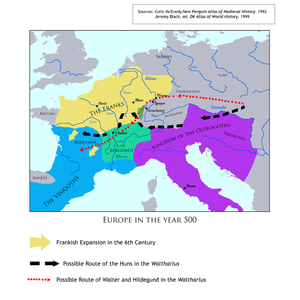| « previous
|
- Prologue
- Introduction: the Huns (1–12)
- The Huns (13–418)
- The Franks under Gibich surrender to Attila, giving Hagen as a hostage (13–33)
- The Burgundians under Hereric surrender to Attila, giving Hildegund as a hostage (34–74)
- The Aquitainians under Alphere surrender to Attila, giving Walther as a hostage (75–92)
- Experience of the hostages at Attila’s court (93–115)
- Death of Gibich, flight of Hagen (116–122)
- Attila’s queen Ospirin advises her husband to ensure Walther’s loyalty by arranging a marriage (123–141)
- Walther rejects Attila’s offer of a bride (142–169)
- Walther leads the army of the Huns to victory in battle (170–214)
- The Escape (215–418)
- Walther returns from battle and encounters Hildegund (215–255)
- Walther reveals to Hildegund his plans for escaping with Attila’s treasure (256–286)
- Walther hosts a luxurious banquet for Attila’s court; eventually all his intoxicated guests fall asleep (287–323)
- Flight of Walther and Hildegund from Attila’s court (324–357)
- The following day, the escape of Walther and Hildegund is discovered by Ospirin (358–379)
- Attila is infuriated and vows revenge on Walther, but can find no one willing to dare to pursue him, even for a large reward (380–418)
- The Single Combats (419–1061)
- Diplomacy (419–639)
- Flight of Walther and Hildegund to the area of Worms (419–435)
- Gunther, King of the Franks, learns of Walther’s presence on his territory and, despite Hagen’s warnings, decides to pursue him for his treasure (436–488)
- Walther makes his camp in a mountainous area and goes to sleep (489–512)
- Gunther and his companions approach Walther’s camp; Hagen unsuccessfully tries to dissuade the king from attacking it (513–531)
- Hildegund sees the Franks approaching and wakes Walther, who calms her fears and prepares for battle; he recognizes Hagen from a distance (532–571)
- Hagen persuades Gunther to try diplomacy before using force (571–580)
- Camalo is sent as a messenger to Walther, who offers to make Gunther a gift in return for allowing his passage (581–616)
- Hagen counsels Gunther to accept the offer, but Gunther rejects this advice, calling him a coward. Insulted, Hagen goes off to a nearby hill (617–639)
- Combat (640–1061)
- 1st single combat: Camalo is sent back to Walther, who slays him (640–685)
- 2nd single combat: Walther slays Kimo/Scaramund, Camalo’s nephew (686–719)
- Gunther encourages his men (720–724)
- 3rd single combat: Walther slays Werinhard, a descendant of the Trojan Pandarus (725–753)
- 4th single combat: Walther slays the Saxon Ekivrid, after an exchange of insults (754–780)
- 5th single combat: Walther slays Hadawart, after an exchange of insults (781–845)
- Hagen sees his nephew Patavrid going off to fight Walther and laments the evil wreaked on mankind by greed (846–877)
- 6th single combat: after trying to dissuade him from fighting, Walther slays Patavrid (878–913)
- 7th single combat: Walther slays Gerwitus (914–940)
- Gunther again encourages his men, giving Walther some time to rest (941–961)
- 8th single combat: Walther is shorn of his hair by Randolf, whom he then slays (962–981)
- Walther is attacked by Eleuthir/Helmnot, assisted by Trogus, Tanastus, and Gunther; he slays all but Gunther (981–1061)
- The Final Combat (1062–1452)
- Gunther tries to persuade Hagen to help him to defeat Waltharius; remembering his wounded honor, Hagen refuses (1062–1088)
- Hagen changes his mind and agrees to help Gunther, but advises that they must lie low wait until Walther comes down from the mountains into open ground (1089–1129)
- Walther decides to spend the night in the mountains. He rematches the severed heads with the bodies of his victims, prays for their souls, then sleeps (1130–1187)
- The following day, Walther and Hildegund set out from the mountains, taking the horses and arms of the defeated warriors (1188–1207)
- Hildegund perceives Gunther and Hagen approaching to attack; the king addresses Walther (1208–1236)
- Walther ignores Gunther and pleads with Hagen to remember the bond of their childhood friendship; Hagen counters that Walther has already broken their faith by slaying Patavrid (1237–1279)
- The fight begins and continues for seven hours; Gunther foolishly tries to retrieve a thrown spear from the ground near Walther and is only saved from death by Hagen’s brave intervention (1280–1345)
- Walther challenges Hagen; he severs Gunther’s leg, but Hagen again saves the king’s life (1346–1375)
- Hagen cuts off Walther’s right hand; Walther gouges out one of Hagen’s eyes and, cutting open his cheek, knocks out four teeth (1376–1395)
- Having wounded each other, the warriors end the battle, drink together, and engage in a friendly exchange of humorous taunt (1396–1442)
- The warriors return to their respective homes; Walther marries Hildegund and eventually becomes king of the Aquitainians (1443–1452)
- Epilogue (1453–1456)
|
|
next »
|
English
|
